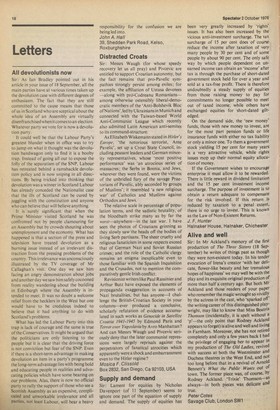Supply and demand
Sir: Lament for equities by Nicholas Davenport (of 11 September) seems to ignore one part of the equation of supply and demand. The supply of equities has been very greatly increased by 'rights' issues. It has also been increased by the vicious anti-investment surcharge. The tax surcharge of 15 per cent does of course reduce the income after taxation of very many people by 30 per cent and of some people by about 90 per cent. The only safe way by which people dependent on unearned income can obtain an 'income' after tax is through the purchase of short-dated government stock held for over a year and sold at a tax-free profit. There is therefore undoubtedly a steady supply of equities from those raising money to pay for commitments no longer possible to meet out of taxed income, while others have exchanged equities for short-dated giltedged.
On the demand side, the 'new money' funds, those with new money to invest, are for the most part pension funds or life insurance funds with either no tax liability or only a minor one. To them a government stock yielding 15 per cent for many years is a very attractive vehicle, while rights issues mop up their normal equity allocation of money.
If the Government wishes to encourage enterprise it must allow it to be rewarded. There is little reward in dividend limitation and the 15 per cent investment income surcharge. The purpose of investment is to obtain a return adequate to compensate for the risk involved. If this return is reduced by taxation to a penal extent, there is no urge to invest. This is known as the Law of Non-Existent Returns.
J. F. Hunter Halnaker House, Halnaker, Chichester


































 Previous page
Previous page